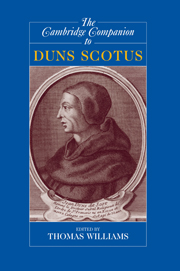Book contents
- Frontmatter
- Introduction
- 1 Scotus on Metaphysics
- 2 Space and Time
- 3 Universals and Individuation
- 4 Duns Scotus’s Modal Theory
- 5 Duns Scotus’s Philosophy of Language
- 6 Duns Scotus on Natural Theology
- 7 Duns Scotus on Natural and Supernatural Knowledge of God
- 8 Philosophy of Mind
- 9 Cognition
- 10 Scotus’s Theory of Natural Law
- 11 From Metaethics to Action Theory
- 12 Rethinking Moral Dispositions
- Bibliography
- Citations of works attributed to John Duns Scotus
- Index
10 - Scotus’s Theory of Natural Law
Published online by Cambridge University Press: 28 May 2006
- Frontmatter
- Introduction
- 1 Scotus on Metaphysics
- 2 Space and Time
- 3 Universals and Individuation
- 4 Duns Scotus’s Modal Theory
- 5 Duns Scotus’s Philosophy of Language
- 6 Duns Scotus on Natural Theology
- 7 Duns Scotus on Natural and Supernatural Knowledge of God
- 8 Philosophy of Mind
- 9 Cognition
- 10 Scotus’s Theory of Natural Law
- 11 From Metaethics to Action Theory
- 12 Rethinking Moral Dispositions
- Bibliography
- Citations of works attributed to John Duns Scotus
- Index
Summary
The theory of natural law is the heart of the ethics of John Duns Scotus. Unlike other approaches in medieval ethics, Scotus’s framework is not that of an ethics of virtue. One reason for this is Scotus’s innovative concept of will, which diverges significantly from its classical and medieval predecessors. This new conception of will, and the assumptions for action theory that arise from it, require a different systematic role for the concept of virtue, one that accords greater weight to the judgment of reason than to the natural goal-directedness of purposive action. What takes center stage in Scotus’s ethics is the obligation on the part of reason to what is apprehended in the natural law as a practical truth, rather than what befits the agent’s end-directed nature as it is manifested in the virtues.
A second theme that determines the fundamental orientation of Scotus’s practical philosophy arises from the twofold task that confronted Scotus as a theologian. On the one hand, because of the influence of the Aristotelian conception of science, he had to show that the claim of theology to be a science could be made good. On the other hand, because he belonged to the Franciscan tradition, he also had to emphasize the practical character of theology. As a result, Scotus was faced with the task of developing an understanding of practical science that would show how both demands could be consistently met1 As I show in detail in this chapter, Scotus’s theory of natural law is precisely a response to this higher standard for rational acceptability.
- Type
- Chapter
- Information
- The Cambridge Companion to Duns Scotus , pp. 312 - 331Publisher: Cambridge University PressPrint publication year: 2002
- 6
- Cited by



